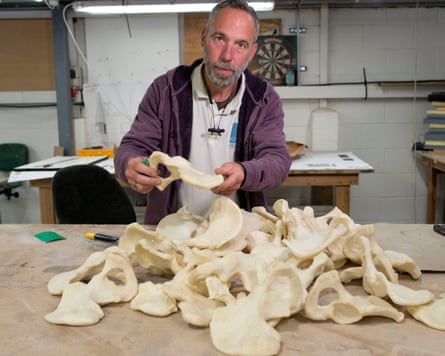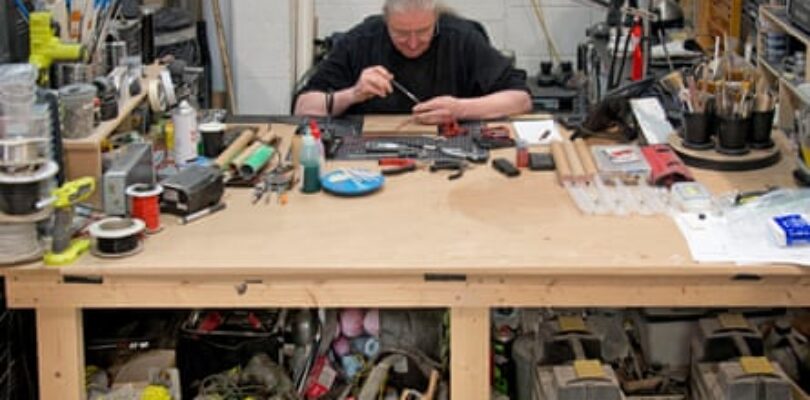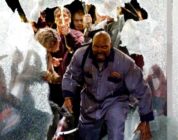It is a sunny May afternoon in leafy Surrey, and Richard St Clair is carefully preparing a bomb. It is not real, but it will look like it is when shown on a Netflix TV show. Across the workshop a colleague is cheerfully sandpapering a pile of hip bones for the 28 Years Later zombie film – trailers suggest a lot of skeletons will be involved.
They are working at db Props, a small company based at Shepperton Studios that has made everything from Thor’s hammer to Alan Turing’s computer in The Imitation Game.
Yet for all its work on huge productions, the workshop has a shadow hanging over it, cast by Donald Trump. The US president this week sent shock waves through the global film industry with a surprise statement that he will bring in a 100% tariff on movies “produced in Foreign Lands”. “WE WANT MOVIES MADE IN AMERICA, AGAIN!” he wrote on his social network Truth Social.
“I’m terrified about this new Trump thing – whatever that may be,” says Dean Brooks, the owner of db Props and a 45-year veteran of the props trade after joining at 16. “This has been a proper kick in the teeth.”
Britain’s film and video production industry employs about 99,000 people, but it punches well above the UK’s economic weight globally, and has a glamour that other industries cannot match. Hollywood relies heavily on Britain to make its films and big budget TV series such as the recent Star Wars series Andor and Tom Cruise’s Mission Impossible franchise. In turn the UK relies on Hollywood for work: inward investment and co-production spend on film and high-end television in the UK reached £4.8bn in 2024, representing 86% of the total, according to the British Film Institute.
With a single post, investment into the UK industry has become “impossible” because of “the trauma in the market, the uncertainty in the market”, according to a senior industry executive. “We should be bashing down the door at No 10,” the source says, calling for further UK tax breaks to show support for the industry. “The UK government needs to do something to give the market a lift.”
Shepperton is owned by the same company as Pinewood Studios in Buckinghamshire, Britain’s most prominent production hub. There are many more in south-east England alone: big facilities include Shinfield in Berkshire, two units at Hertfordshire’s Elstree, and the former aircraft hangars at Cardington in Bedfordshire. Cardiff, Bristol, Belfast and Scotland all have large spaces. Proposals for new facilities in Marlow in Buckinghamshire and Sunderland in Tyne and Wear, and the revival of Ealing Studios in west London would add even more.
“Everybody thinks that the uncertainty alone already has a chilling effect,” says Jon Wardle, the director of the National Film and Television School in Buckinghamshire, whose recent alumni credits include Wicked, Conclave and Gladiator II. The UK has offered tax relief for film production for years, making it a “boringly, Britishly consistent” bet for US producers, he says. Trump has cast doubt over that model.
Hollywood studios can claim 25.5% tax relief on UK production expenditure, whereas there are no federal government subsidies in the US. The UK benefits from shared language and culture, up to a point, while costs in Hollywood are much higher in part because of strong unions. US film workers’ unions have responded with delight at the prospect of work being forced back to California, although Wardle says he doubts they would benefit in the end if tariffs are imposed because the overall market could shrink.

“The fact that the UK has been eating the US’s lunch when it comes to production for the last decade is no secret,” says one executive. Trump is “absolutely right that the US should be more competitive”, the executive adds, but has got the remedy “horrifically wrong”.
There is still a buzz of Netflix productions at Shepperton, but the overall industry has been struggling. The “streaming wars” delivered a huge bounty of work, as Netflix’s rapid ascent and interest rates that were historically low spurred huge spending on film and TV by the US rivals Disney, Amazon and Apple, on top of a host of smaller contenders. However, that boom was ended by a surge in borrowing costs, a Hollywood writers’ strike and an actors’ strike, plus a darkening global economy.
“It’s been so bad,” says Brooks. “We can’t handle any more storms.”
Brooks’s workshop has areas for woodwork, metalwork and a “sticky room” for forming intricate shapes in silicon moulds – plus shelves of random stuff that might be useful as a bomb fuse or a gothic door handle for the most recent Snow White film. However, he only has three people in his workshop compared with 12 three years ago, and some freelancers have decided to retrain as plumbers or carpenters.
“We’re all creative people and we do enjoy it,” he adds. “We’re just not enjoying the environment.”
Governments have wanted homegrown film production for almost as long as the industry has existed. In 1927 the UK forced Americans to make a certain number of films in Britain if the country also wanted to distribute Hollywood products there. Companies built studios at Elstree, Teddington and Wembley in response, but it spawned shabby “quota quickies” that were churned out to meet the requirements. Nevertheless, Britain’s industry got past that to become a world leader.
Yet the UK faces an accelerating international race between governments keen for the glamour of film and TV jobs. Chunky tax breaks have been on offer for productions in Budapest in Hungary, in the Czech Republic, Australia’s Gold Coast, New Zealand and across Canada. They would also face turmoil from tariffs.
The White House has given no clues – if it has any to give – of how such tariffs would work in practice: valuing services as they cross borders is tricky, as is determining when a film counts as American, or who exactly would have to pay higher taxes.
“It all looks pretty unworkable given how the international film industry is all bound up together,” says Mike Downey, a veteran producer and chair of the European Film Academy. “It hasn’t been thought through, and it looks to me almost impossible to regulate except with a very blunt instrument.”
Yet Downey adds that signs that the US will go ahead will cause “an initial freeze on production, while everyone works out what this means”, and most likely a reversal of so-called runaway productions, when a US-focused show is made abroad.
“If they go through, in the worst possible case it will be a total wipeout,” says Downey. “There’s nowhere to turn because no one ever envisaged a world where there would be no US business. The goose that laid the golden egg is ready to take off.”




